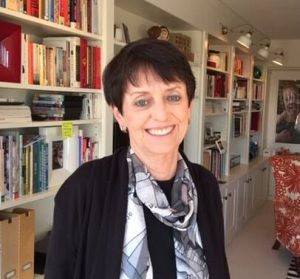Mary Powell

PROFILE OF COMMUNITY MEMBER MARY POWELL: WORKING TO BRING RESIDENT VOICES TO THE FOREFRONT AND UNIFY OUR COMMUNITY
Mary Powell is a community member who has worked to overcome divisions and amplify resident voices within the greater Buckeye-Woodland-Larchmere-Ludlow-Shaker Square community. Alongside other activists, she took action on the issues she recognized and formed the catalyst group Resident Voices in January 2016. But her commitment to community health and engagement runs much further back through the years and much farther across the boundaries of states and nations.
Powell has lived and worked in many places, but her commitment to positive change has remained strong everywhere she goes. While a student nurse at Columbia University, she served her public health rotation on Manhattan’s lower west side. In order to help pay for college, she joined the Army Nurse Corps and served for two years after graduating. Her time in the Army Nurse Corps included a year of service in Vietnam, about which she has published a book titled A World of Hurt: Between Innocence and Arrogance in Vietnam which chronicles her experiences and those of seven friends who served with her.
After her time in Vietnam, Powell worked as a public health nurse outside Denver. Her experience there taught her about the similarities between challenges faced by urban and rural areas and how essential it is for people on all sides to come together to advocate for change. Powell then pursued further education at the University of Colorado, where she earned an M.A. in Urban Sociology. Her journey took her to Michigan and New York before she landed in Shaker Heights in 1989. Throughout her life she has sought ways to deepen her involvement in community health issues. She has advocated for domestic violence victims, started a bike helmet safety program, and worked with a Red Cross disaster action team. Today, Powell is active with the Thea Bowman Center in Mt. Pleasant, where she has served on the board for ten years.
Powell moved to Shaker Square with her husband Doug in 2007, and became involved as Ward 4’s Neighborhood Team Leader for Barack Obama’s presidential bids in both 2008 and 2012. She knocked on many, many doors and thus got to meet hundreds of residents. Through her involvement, Powell became aware of various divisions running through the greater Buckeye-Woodland-Larchmere-Ludlow-Shaker Square community. She found that “while the community possesses multiple assets, a history of physical neglect and civic divisions undercut those assets.” In addition to racial and socio-economic divides, there were also two city council reps, two county reps, and two separate CDCs. Powell saw an untapped potential for overcoming these “fault lines” and cultivating a unified community that would provide strength, security, and opportunity for growth.
Powell joined with other activists in the area who shared her vision and, in January of 2016, they came together and formed the group Resident Voices. Resident Voices’ mission was to “amplify resident perspectives by encouraging cooperation among residents and community stakeholders, creating the foundation for an interconnected, thriving community.” The founders hoped that Resident Voices would contribute to the growth of a more unified, cooperative, resilient community. Resident Voices did not intend to be yet another organization for people to pin their hopes on; rather, the group was meant to be a “catalyst” for engaging residents and creating a vision for what might change in the area.
While Resident Voices did not instigate as much change as anticipated, Powell sees the group’s work as part of a bigger force of community engagement that has been bubbling up since 2016 among various individuals and groups. She sees how community involvement has been supported by Neighborhood Connections and notes increased attendance and energy at community meetings such as the Shaker Square Alliance. She is also glad that resident input was solicited in the recent decision to have a single CDC for the greater area and she is hopeful that this change will bring more unity to reinvestment and community engagement efforts.
When she looks back over the principles that guide her activism and what she has learned from her experience, Powell believes that the type of unified, energized, engaged community like that envisioned by Resident Voices cannot be forced into existence, but rather must come from the grassroots. She believes that “residents who have a sense of their own autonomy will take decision-making into their own hands.” Powell has found that in all the places she has lived, people get involved when two requirements are met: 1) An issue affects them on the local level, and 2) They feel someone is listening to them when they show up.
Driven by the question of “what would we accomplish if we were a unified community,” Powell worked with others to form a catalyst group and develop a vision for the community. Her story shows us how we might continue to work to heal our community’s ills through active problem-solving and engagement in our neighborhoods.
